- Home
- C. C. Humphreys
Chasing the Wind Page 2
Chasing the Wind Read online
Page 2
“Hello, Sydney,” he called, though probably not loud enough to be heard against the rain and the clanging bell.
The biggest man opposite didn’t reply. Just raised an arm and pointed at Richard. The other two men nodded and stepped from the doorway.
Richard thought of running; he’d been fast in his day, had won races as a kid. But his legs were whisky weak, while these bailiffs were young and no doubt swift enough despite their bulk. He thought of talking. Talking was what had raised the near-illiterate boy born in Cicero, Illinois, from poverty into the top-ten league of America’s wealthiest men. But yesterday Richard had talked himself hoarse to the man now pointing from the opposite doorway. Sydney Munroe had been a few ranks below him in the league when they’d met, and they’d become partners in multiple business ventures. Now it looked like the big guy was going to vault above. For all Richard’s talking—pleading is what it had been—he had achieved nothing. Worse, he’d let slip the piece of information that not all his efforts in trying to dig himself out of debt were entirely legit. And he knew one thing: if he went to jail, Roxy would never go to Canada, never get on with her own life. She’d visit him every Sunday and work her fingers raw to free him. And he hadn’t raised his kid to work like he’d had to.
As the men paused, waiting for the tram to pass, Richard Loewen looked up into the sky. A different world up there, blown wrappers and newsprint set against clouds that weren’t so much grey as black. Even as he looked, lightning flashed. The thunder boomed not a second later. The storm was over him, right above, the tram’s bell so loud. It was the second-to-last thing he heard. The very last was the screech of the tram’s brakes as he stepped onto the tracks and the driver applied them too late, way too late.
* * *
Roxy was dreaming, as usual, of flying. But whisky made it strange. She was doing a stunt, a barrel roll, but the plane had stalled halfway through and she couldn’t get it going again. She was hanging upside down in the open cockpit and she hadn’t buckled on her restraints.
“What?” she said, sitting up. There were so many sounds: thunder, crazy rain, screams, a woman weeping. “Pops?” she called. He’d been right there. When she put her hand on the seat next to her, it was still warm. She looked across the bar. Max was staring at the door. “Where’s my dad? In the can?” she asked. “Max? Where’d he go?”
The bartender turned back to her. There was trouble in his eyes. “He just left.”
She lurched up. “Open it.”
“Miss Loewen, your father said—”
“Open the damn door!”
She swayed before it as he reached for the bolts, shrugging into her beaver fur coat and pushing the heel of her hands again and again into her eyes. It did nothing to clear them. She tried to focus on the tasseled ropes that gathered the plush velvet curtains to either side.
The door opened; the cold air hit her like a slap and the muffled sounds exploded. The weeping—it wasn’t a woman but a man, a uniformed man in a grey jacket and a peaked cap. He crouched over a bundle of garbage on the ground, wedged under the front of a trolley car. Then she saw that in the garbage were Oxford brogues, looking just like the ones her dad ordered from Church’s in London. Why would anyone throw them out, much less toss them into garbage in the middle of the street?
It was like the one key piece in a jigsaw puzzle: from separate images, she suddenly saw the whole. Saw the brogues, saw the feet they were attached to, saw everything. The tweed overcoat that would smell of his pipe tobacco if she could only get close enough. The narrow pinstripe of his Savile Row suit. The left hand with the pinky ring, and the bushy hair above each knuckle. She always teased him about that: “If I’m a rabbit,” she’d say, “I’ve got a monkey for a dad.”
Her father was lying on the street in front of a trolley car—which seemed crazy considering the weather, but perhaps not when you considered how much Scotch he’d drunk. But why was the driver crying? Babbling the same words over and over, tears and a thick Bronx accent muddying them: “I tell ya, the guy just stepped out! I couldn’t do nothin’!” A crowd jostled near, fascination or horror on every face.
“Pops,” she said, “you gotta get up. You’re makin’ a scene.”
She stepped around to help him and saw his face. What was left of his face.
Somebody switched off the sound. One moment, nearby, the weeping of a man in uniform, the awed chatter of a crowd. Beyond, car horns, brakes, shouts. Above, thunder. Now, silence. Roxy looked at faces; people’s mouths shaping words, nothing emerging. But she was wrong; there wasn’t silence. There was a whine, high pitched, like a mosquito she’d wave away on the beach in the summer. Except, when she tried that now, her hand moved too slowly and the whine just got closer.
Somebody switched on a street lamp. The thunder clouds had turned the road as dark as night, lit only by sporadic lightning. Now it was bathed in a glow, yellow and sickly. It etched everything there—the silently talking people, the silently screaming man.
Somebody kicked her in the stomach, though she didn’t see who, and the pain she felt was as bad as when Blaze had kicked her after she’d startled the colt. Her breath went and she cried out to the people around for help. Except, like them she made no sound.
Somebody. Some…body. Lying on the ground, her hand against a tweed shoulder. Nobody she knew lay down in the street.
There was a big man staring down at her, someone she did know: Sydney Munroe. He’d stayed at their house in Sag Harbor. He was a business partner of her father’s. His eyes were fixed on her. She stared back as he spoke to the two younger men in front of him, without taking his gaze from her. Again she couldn’t hear the words. But the fleshy lips moved in a way she could read: “Arrest her.”
She saw him mouth the words—and they turned the sound back on, instantly so loud she had to block her ears with her hands. It did no good. The horns, the cries, the whining, the shouts slipped by them.
So did the younger man’s reply. “But, Mr. Munroe, her dad just—”
“Died. He just died. So his estate—and the estate’s debts—are now hers.” He waved at Roxy. “Do your job.”
Both men shrugged. Both took a step toward her, elbowing through the mob. Their movement whipped the yellow glow away as if it were a sheet. Roxy could see, she could hear, she could move…
“Move!”
It was a shouted command. Maybe she shouted it. She got up, turned and ran.
Her first steps were skittery. She went as much to the side as forward until she found her stride. Before she’d won races on horses and planes, she’d won them on her feet. Richard Loewen had left her more than ten bucks, a train ticket and some worthless land in the Adirondacks. He’d left her his green eyes. He’d left her his speed.
She weaved between people on the sidewalk and cars in the street, footfalls behind her, thumping heavy on the rain-slick pavement. They wouldn’t catch her unless she fell. So she concentrated hard on not doing that.
When she hit the corner at Fifth, the lights were just turning green. Vehicles that had been gunning their engines lurched forward. If she stopped, she’d be trapped. If she made it across…
She didn’t stop. She didn’t look at the cars and cabs hurtling toward her. She barely heard them, their shrieking brakes and shrieking drivers. Only the very last vehicle caught her attention, because this one caught her dangling rear foot, even as her front one hit the eastern sidewalk. It spun her and sent her crashing into a mailbox.
The rider of a motorbike didn’t fare so well. Yelping, he put it down on its side as both man and machine slid twenty yards up the street.
The bray of horns, the cries of shock, the shouts of fury, the rain falling in sheets. Dazed, Roxy pulled herself up and looked back. Her pursuers were picking their way through the stalled traffic. They were halfway across Fifth, but it was hard going for big men weaving through cars, some of which had locked fenders. She didn’t have a lotta time, but she had a little.
; She stood, cried out. Her ankle hurt. The running might be over.
She looked up the avenue. The motorcycle and its rider were both on their sides. He was moving; the bike was not. But she could see, with all the clarity of her drunken vision, the blue smoke that poured from its exhaust.
She lurched toward it, swinging her bad leg, pushing hard off her good one. She didn’t look back, but the shouts told her the men weren’t far behind. There was no time to do anything more than jerk the bike up, throw herself across it and hit the throttle.
She skidded. She felt rather than saw the hand that grabbed for her. Ducking that, she gunned the engine and took off up Fifth Avenue.
For the first few blocks she was occupied with not crashing and dying. The machine was an Ace, a stroke of fortune, because she’d ridden one on Long Island the previous summer. As she hit Sixtieth, she heard the first siren start up behind her. She needed somewhere to go and fast.
The road ahead was clearer, though rain still came down cold and hard, and wind slapped her around. Shrugging into the storm, Roxy kicked the Ace into fourth, opened the throttle, and headed for Queens. The Long Island Motor Parkway began in the borough. She didn’t have any money for the toll. She’d just have to owe it.
* * *
Amelia Earhart held a gavel of sorts—it was actually a monkey wrench—above the table in the hangar’s back room. “So, before I declare the Ninety-Nines, the world’s first all-women’s flying association, officially formed, is there any final business?”
The other flyers looked around at each other. Officers had been proposed and seconded. The seventy-two absentees still had to send in their votes, but everyone knew the woman holding the wrench would be acclaimed as first president.
“No? Then it is my great pleasure to—”
“Amelia?” It was Louise Thaden who interrupted. She rose, gesturing outside. “What’s that?”
That was an engine. The sound of a plane engine would immediately halt any business, in case the pilot was struggling to land and needed help.
The wrench hovered as they all listened. “Just a motorbike,” said Amelia, lifting her gavel, then pausing again. “Though I am curious,” she continued, “as to why it is accompanied by so many sirens.”
The pilots listened as engine growl and siren wail drew nearer. Amelia looked over the others’ heads and locked eyes again with Louise. They both had the same thought. They both mouthed the same word.
“Roxy.”
Amelia lowered the wrench.
* * *
Between the soaking rain and the wind that had tried to rip her from her saddle, Roxy Loewen was halfway to sober when she tore past the hangar and over the grass of Curtiss Field Aerodrome. She was shaking, though, chilled to the bone. Her chenille silk dress suited the speakeasy, not the parkway, and she hadn’t paused to button up her fur.
She pulled up beside her plane and dropped the Ace on its kickstand. Suddenly, she felt totally exhausted. What the hell was she going to do now?
“What the hell are you doing?”
Roxy turned. There she was, her friend, her mentor, at the head of a group of pilots. “Hey, Amelia.”
“Don’t you ‘Hey, Amelia’ me.” Amelia tipped her head to the sirens growing ever louder. “They here for you?”
Roxy nodded, unable to speak. Amelia turned to the others. “Give us a moment?” As they backed off a ways, Amelia added, “Louise?”
“Uh-huh?”
“Those sirens? Distract them for a while, will ya?”
The younger pilot osmiled. “Sure will try. Come on, ladies!”
As Louise and half the pilots ran to the road beyond the hangar, Amelia went to Roxy. “Kid, you’re freezing. We’ve got to get you in—”
“No!” Roxy clutched Amelia’s arms. “Help me. I’ve gotta get away.”
“What trouble are you in this time?”
“The worst.” She knew now, away from the sight, away from the sound and the soundlessness. And Amelia was the one person she could convey it to. “Pa’s dead.”
“What? How?”
“I think he…” Roxy couldn’t bring herself to say it. She took a big breath. “They’ll take everything, all he built, and—” She gripped Amelia harder. The sirens were so close now they had to be through the gates. “And now they’ve come to take Asteria. I can’t let them,” she said. “I can’t.”
Roxy turned to the plane and put a foot on the step, but it slipped off.
“Stop!” cried Amelia. “What do you think you’re doing?”
“Getting the hell out of here.”
“You crazy? You’re drunk. I can smell it on you.”
“No drunker than you were in Denver.”
“That was—” Amelia broke off. “You can’t. You’ll kill yourself.”
“I will if I stay here. May as well if they take my plane—” She looked into her friend’s eyes. “Please! It’s the last thing I’ve got of him.”
Amelia gave a deep sigh. She ripped off her leather jacket, thrust it toward Roxy and called the other way, “Edna, a hand here?” The flyer ran over. “Lend me your flying helmet and goggles, will you?” The woman obliged. Some sirens had stopped, but others were still coming. Shouts came from the other side of the hangar, loud male voices. “Now, all of you—go help Louise hold them off.”
The others rushed toward the hangar. Roxy hurled the fur up into the cockpit, slipped into the flying jacket and fumbled with the buttons. “Here,” said Amelia, pulling her close. “I’ll do those—you do this.” She passed over the helmet. Roxy donned it and tightened the strap while Amelia buttoned her up. “Where are you going?”
“Canada. I’ve got an aunt in—”
“Wait, never mind! If I don’t know, I can’t tell. Now, move!” She boosted her friend onto the step and Roxy tumbled into the cockpit, spread the fur and sat. Amelia ran to the nose and put both hands on the top side of one propeller blade. “Contact,” she yelled.
Roxy threw the switch. “Contact.”
Using her weight, Amelia dropped hard and stepped back. Nothing. “Off!” she shouted.
“Off!”
As she grasped the blade again, a loud male voice bellowed, “Stop! That woman is under arrest.”
But Amelia didn’t stop. Instead she shouted, “Contact!”
“Contact!”
Amelia swung. The engine kicked and she dived to the side then back in behind the blades, to rip the blocks from the wheels. As the plane lurched forward, she hurled herself away and fell straight into the arms of the policeman who had run forward. “What was that you said, sweetheart?” she asked him, gazing up. “Didn’t catch it.”
The Breda was a racer, in the air or on the ground. Even as the cops forced their way through the crowd of pilots, Asteria had reached the edge of the runway.
Roxy squinted back. A handful of cops broke from the throng. In normal circumstances, she’d use the whole length of the strip to take off. The wind sock showed her the wind was blowing roughly straight down the field. In normal circumstances, she’d taxi gently into position and take off with it behind her. In normal circumstances, she’d never rush her cold engine.
These were not normal circumstances. If she took all that time, they’d get a car onto the track and block her. There was only one option left—she’d have to take off cross-field and crosswind.
Roxy opened the throttle halfway. The cool engine coughed in protest, but she sped forward. She had maybe a hundred yards before the fence marking the aerodrome’s boundary. But Asteria was small, and light. She had good lift.
Pulling the stick gently back, Roxy brought the rear wheel up. Working the left rudder hard to counter the wind, she sighted on an elm at the edge of the far field. The narrow runway was smooth, its verge a lot less so. As she bounced over the first knoll, as she took a little air, Roxy thought, Here’s nothing. Now opening the throttle all the way, she pulled the stick hard back.
Her right front wheel clipped a fence
post. It spun her, one wing tipping toward the earth. But she plied the rudder, threw her own weight back and the stick with it.
She missed the elm by a clear foot.
Banking, she swung back toward the aerodrome. She was only about a hundred feet up, so could see them all. The policemen—there had to be twenty—some standing with their hands on their hips, looking bemused; some pounding their fists in the air. Amelia, standing with her arm around Louise in the midst of all the girls, was smiling. Finally, she noticed a figure watching her, larger than the rest, a little apart. And he—Sydney Munroe—looked nothing less than apoplectically angry.
Roxy always liked a crowd, and suddenly remembered the stunt she’d failed to pull off in her dream. A barrel roll. Stunts were always done at least two thousand feet up. Hell with that, she thought. She snapped her safety belt on, pushed the rudder and stick left. Then, as Asteria’s wings angled, she kicked the rudder over and pulled the stick diagonally hard back.
Roaring, the plane barrel-rolled, one hundred feet over the spectators’ heads. Even above the engine’s roar she could hear the screams.
She reversed the movements of stick and rudder, stalled as she came out of the roll, drove the stick forward. The engine fired and, level, she started her climb.
It was cold, but her legs practically rested under the Breda’s engine mount. Though only covered in wet silk, they began to warm. She drew the edges of beaver fur over them. The fleece lining and fur collar of Amelia’s leather jacket also helped.
Roxy reached the low ceiling, burst through and kept climbing. The world went dark for a while. The buzz of good whisky had dwindled to a residue of pain. But it was all she had left of her father so she clung to it. All she had left of her mother was the rabbit’s foot on the chain around her neck. Thinking of one, clutching the other, she cried now, because she could; because she was alone and not even God could see her in these clouds. Great shuddering sobs came, snot and teardrops freezing on her face. Up and up she went, with her sorrow, until it got hard to breathe and she thought she’d never make the summit. Then in a heartbeat, grey nothing turned to brilliant sunshine. Levelling, she rode the cloud tops north.

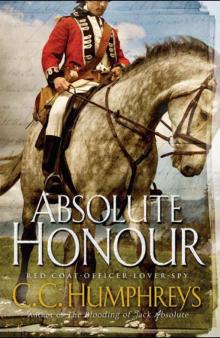 Absolute Honour
Absolute Honour Plague
Plague Blood Ties
Blood Ties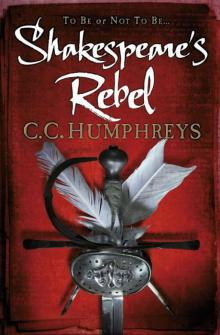 Shakespeare's Rebel
Shakespeare's Rebel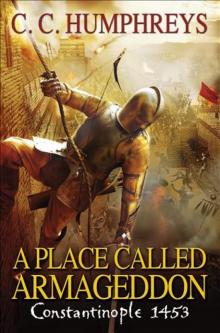 A Place Called Armageddon
A Place Called Armageddon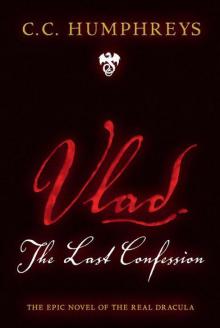 Vlad: The Last Confession
Vlad: The Last Confession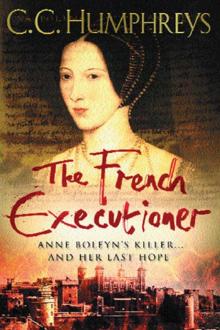 The French Executioner
The French Executioner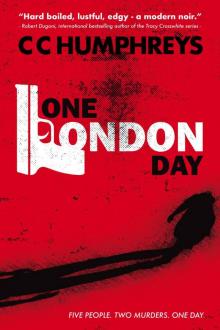 One London Day
One London Day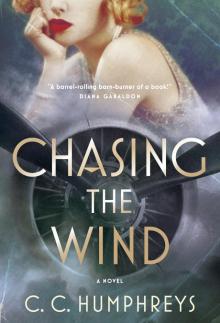 Chasing the Wind
Chasing the Wind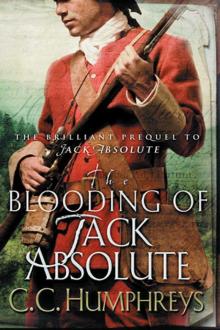 The Blooding of Jack Absolute
The Blooding of Jack Absolute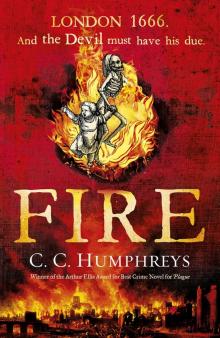 Fire
Fire